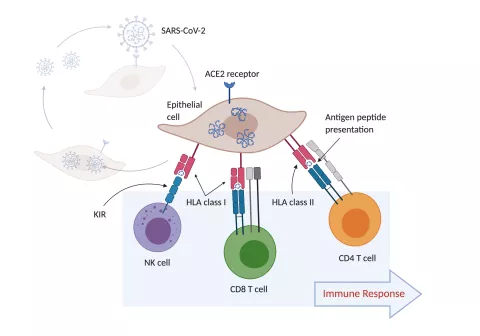The major genetic contribution of the human leukocyte antigen (HLA) region to disease risk has been recognized for nearly fifty years, with hundreds of associations observed in autoimmunity, infectious disease, cancer, and major drug-hypersensitivities. Because of its pivotal role in the immune response to pathogens, we expect that HLA variation will also be found to play a role in SARS-CoV-2 infection and/or COVID-19 outcomes.
The project is supported by NIH R01AI159260, in collaboration with the National Marrow Donor Program and UCSF COVID-19 Citizen Science initiative, investigates the influence of human leukocyte antigen (HLA) genotypes on COVID-19 vaccine side effects, antibody production, and immune responses during vaccination. While COVID-19 vaccines are overwhelmingly safe, vaccine-induced immune activation can lead to systemic side effects such as fever, muscle, headaches and fatigue, as well as local reactions like pain, redness, and swelling at the injection site.
Leveraging pre-existing HLA genotyping data from up to 3.5 million volunteer bone marrow donors, we previously demonstrated that HLA variation is associated with an asymptomatic disease course in SARS-CoV-2 infections. We aim to explore whether the observed vaccine side effects are mainly driven by humoral or cellular immune mechanisms and how specific HLA genotypes might influence CD8+ T cell activation, and indirectly affect humoral responses through helper T cell interactions. We will contextualize these association studies through examination of the role of HLA presentation of SARS-CoV-2 antigens. In summary, we leverage large and diverse patient cohorts alongside cutting-edge technology and molecular biology to reveal the role of the important immune loci in COVID-19.
Additionally, in collaboration with a global consortium of leaders in the immnunogenetics community, we have developed a web platform that will serve as a data aggregation site, knowledge base and technical resource for HLA and immunogenetics research on the COVID-19 pandemic, intended to pool resources and increase power to accelerate discovery.
